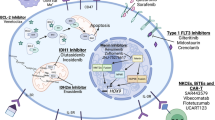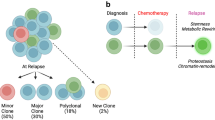Abstract
Purpose
This study evaluated the impact of antibacterial prophylaxis with levofloxacin in relapsed/refractory acute myeloid leukemia (AML) patients.
Methods
This was a retrospective, single-center, cohort study. Adult patients with relapsed/refractory AML admitted for reinduction chemotherapy between November 1, 2006 and June 15, 2015 were screened for inclusion. A protocol initiating levofloxacin prophylaxis was implemented on December 1, 2013. Patients receiving hypomethylating agents (decitabine/azacitidine) were not administered antibacterial prophylaxis and thus not included in this analysis. Patients receiving broad spectrum antibiotics on day 1 of reinduction chemotherapy or receiving another antibacterial agent for prophylaxis were also excluded. Ninety-seven patients were included in the control group (no prophylaxis), while 48 patients received levofloxacin prophylaxis. Patients in the prophylaxis group received levofloxacin 500 mg once daily on day 1 of chemotherapy and continued until neutrophil recovery (or hospital discharge or death).
Results
There was a reduction in the rate of bacteremia in the prophylaxis group (37.5 %) compared to the control group (53.6 %, p = 0.0789), largely due to a reduction in gram-negative bacteremia (2.1 vs. 21.6 % respectively, p = 0.001). No difference was found between prophylaxis and the control groups in the incidence of neutropenic fever, incidence of multidrug resistance, length of hospital or ICU stay, or mortality.
Conclusions
Levofloxacin prophylaxis reduced the rate of infections overall in adult patients with relapsed/refractory AML, without increasing rates of multidrug-resistant organisms.


Similar content being viewed by others
References
Freifeld AG, Bow EJ, Sepkowitz KA, Boeckh MJ, Ito JI, Mullen CA et al (2011) Clinical practice guideline for the use of antimicrobial agents in neutropenic patients with cancer: 2010 update by the Infectious Diseases Society of America. Clin Infect Dis 52(4):427–431
Flowers CR, Seidenfeld J, Bow EJ, Karten C, Gleason C, Hawley DK et al (2013) Antimicrobial prophylaxis and outpatient management of fever and neutropenia in adults treated for malignancy: American Society of Clinical Oncology clinical practice guideline. J Clin Oncol 31(6):794–810
Kuderer NM, Dale DC, Crawford J, Cosler LE, Lyman GH (2006) Mortality, morbidity, and cost associated with febrile neutropenia in adult cancer patients. Cancer 106(10):2258–2266
Marini BL, Hough SM, Gregg KS, Abu-Seir H, Nagel JL (2015) Risk factors for piperacillin/tazobactam-resistant gram-negative infection in hematology/oncology patients with febrile neutropenia. Support Care Cancer 23(8):2287–2295
Kern WV, Klose K, Jellen-Ritter AS, Oethinger M, Bohnert J, Kern P et al (2005) Fluoroquinolone resistance of Escherichia coli at a cancer center: epidemiologic evolution and effects of discontinuing prophylactic fluoroquinolone use in neutropenic patients with leukemia. Eur J Clin Microbiol Infect Dis 24(2):111–118
Pepin J, Saheb N, Coulombe MA, Alary ME, Corriveau MP, Authier S et al (2005) Emergence of fluoroquinolones as the predominant risk factor for Clostridium difficile-associated diarrhea: a cohort study during an epidemic in Quebec. Clin Infect Dis 41(9):1254–1260
Bucaneve G, Micozzi A, Menichetti F, Martino P, Dionisi MS, Martinelli G et al (2005) Levofloxacin to prevent bacterial infection in patients with cancer and neutropenia. N Engl J Med 353(10):977–987
Cullen M, Steven N, Billingham L, Gaunt C, Hastings M, Simmonds P et al (2005) Antibacterial prophylaxis after chemotherapy for solid tumors and lymphomas. N Engl J Med 353(10):988–998
Schuette W, Nagel S, von Weikersthal LF, Pabst S, Schumann C, Deuss B et al (2011) Randomized phase III trial of docetaxel plus carboplatin with or without levofloxacin prophylaxis in elderly patients with advanced non-small cell lung cancer: the APRONTA trial. J Thorac Oncol 6(12):2090–2096
Verlinden A, Jansens H, Goossens H, van de Velde AL, Schroyens WA, Berneman ZN, et al. (2014) Clinical and microbiological impact of discontinuation of fluoroquinolone prophylaxis in patients with prolonged profound neutropenia. Eur J Haematol
Harris PA, Taylor R, Thielke R, Payne J, Gonzalez N, Conde JG (2009) Research electronic data capture (REDCap)—a metadata-driven methodology and workflow process for providing translational research informatics support. J Biomed Inform 42(2):377–381
Rosa RG, Goldani LZ, dos Santos RP (2014) Risk factors for multi-drug-resistant bacteremia in hospitalized cancer patients with febrile neutropenia: a cohort study. Am J Infect Control 42(1):74–76
Macesic N, Morrissey CO, Cheng AC, Spencer A, Peleg AY (2014) Changing microbial epidemiology in hematopoietic stem cell transplant recipients: increasing resistance over a 9-year period. Transpl Infect Dis 16(6):887–896
Alp S, Akova M (2013) Management of febrile neutropenia in the era of bacterial resistance. Ther Adv Infect Dis 1(1):37–43
Ashour HM, el-Sharif A (2007) Microbial spectrum and antibiotic susceptibility profile of gram-positive aerobic bacteria isolated from cancer patients. J Clin Oncol 25(36):5763–5769
Libuit J, Whitman A, Wolfe R, Washington CS (2014) Empiric vancomycin use in febrile neutropenic oncology patients. Open Forum Infect Dis 1(1):ofu006
Weinstock DM, Conlon M, Iovino C, Aubrey T, Gudiol C, Riedel E et al (2007) Colonization, bloodstream infection, and mortality caused by vancomycin-resistant enterococcus early after allogeneic hematopoietic stem cell transplant. Biol Blood Marrow Transplant 13(5):615–621
Gafter-Gvili A, Paul M, Fraser A, Leibovici L (2007) Effect of quinolone prophylaxis in afebrile neutropenic patients on microbial resistance: systematic review and meta-analysis. J Antimicrob Chemother 59(1):5–22
Prabhu RM, Piper KE, Litzow MR, Steckelberg JM, Patel R (2005) Emergence of quinolone resistance among viridans group streptococci isolated from the oropharynx of neutropenic peripheral blood stem cell transplant patients receiving quinolone antimicrobial prophylaxis. Eur J Clin Microbiol Infect Dis 24(12):832–838
Razonable RR, Litzow MR, Khaliq Y, Piper KE, Rouse MS, Patel R (2002) Bacteremia due to viridans group streptococci with diminished susceptibility to levofloxacin among neutropenic patients receiving levofloxacin prophylaxis. Clin Infect Dis 34(11):1469–1474
Acknowledgments
Data collection using the REDCap software was supported by the Michigan Institute for Clinical and Health Research grant (CTSA:ULT1TR000433). We also acknowledge the University of Michigan Honest Broker Office for the assistance with data extraction from the electronic medical record.
Author information
Authors and Affiliations
Corresponding author
Ethics declarations
All procedures performed in studies involving human participants were in accordance with the ethical standards of the institutional and/or national research committee and with the 1964 Helsinki Declaration and its later amendments or comparable ethical standards. For this type of study, formal consent is not required, and as such, a waiver of informed consent was granted by the institutional review board.
Conflicts of interest
The authors declare that they have no conflicts of interest.
Rights and permissions
About this article
Cite this article
Ganti, B.R., Marini, B.L., Nagel, J. et al. Impact of antibacterial prophylaxis during reinduction chemotherapy for relapse/refractory acute myeloid leukemia. Support Care Cancer 25, 541–547 (2017). https://doi.org/10.1007/s00520-016-3436-3
Received:
Accepted:
Published:
Issue Date:
DOI: https://doi.org/10.1007/s00520-016-3436-3




